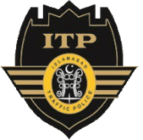Islamabad Traffic Police
| Islamabad Traffic Police | |
|---|---|
| Abbreviation | ITP |
|
Logo of the Islamabad Traffic Police | |
| Agency overview | |
| Formed | January 28, 2006 |
| Preceding agency | Traffic Police |
| Legal personality | Governmental: Government agency |
| Jurisdictional structure | |
| Operations jurisdiction* | City of Islamabad, Pakistan |
| Governing body | Capital Territory Police |
| General nature | |
| Operational structure | |
| Headquarters |
Islamabad |
| Sworn members | 709 (28 January 2006) |
| Elected officer responsible | Malik Matloob Ahmad Awan, Senior Superintendent of Police (SSP) |
| Website | |
| http://www.islamabadtrafficpolice.gov.pk | |
| Footnotes | |
|
* Divisional agency: Division of the country, over which the agency has usual operational jurisdiction. Note: Data for organization as at December, 2009. | |
Islamabad Traffic Police is a "model traffic police force" formed under the Capital Territory Police in 2006 to "bring a new and healthy change in the traffic system" in Islamabad, the capital of Pakistan.[1] The Police Department was established on the pattern of an earlier success story in Pakistan, National Highways and Motorways Police (NH&MP) which was established in 1997. The Islamabad Traffic Police (ITP) came of age between 2007 - 2010 and came to be known as a corruption free and equal application of law police organization. Mr. Sultan Azim Temuri, Senior Superintendent of Police, and Mr. Ashfaq Ahmad Khan, Superintendent of Police, are considered the two pioneering officers of the Police Service of Pakistan (PSP) who provided police leadership in the planning, organization, development and sustainability of this widely acclaimed police organization. The organization was awarded ISO 9001: 2008 certification on 23 June 2009 for introducing state of the art Driver's License, First Police Radio Station, ITP FM 92.4 headed by Mrs Aisha Jamil, the new laws of prohibition on using mobile phone while driving and the wearing of seat-belt while driving, and client-oriented policing service in Pakistan. Hallmark of this traffic police department is that Rule of Law prevails on the roads of Islamabad, and Driver's Licenses are issued to only the qualified drivers after through testing of driving ability and medical fitness. The organization also has a Traffic Theme Park and Drving School for the education of school kids and driving training to the aspirants. Eversince the ITP took over the control in Islamabad, the incidents of road accidents have decreased, and drivers are seen wearing seat belts and avoiding to use mobile phone while driving, indicators of rule of law hardly seen in many other cities of Pakistan and other developing countries of South Asia and world as a whole. The police force is responsible for the enforcement of laws [traffic rules], education of traffic laws to the community, issuance of driver' licenses to qualified drivers, advice to the Capital Development Authority (CDA)on road Engineering issues, and regulation of vehicular and pedestrian traffic on highways, avenues and roads of Islamabad and is rated as second corruption free police organization in Pakistan, after National Highways and Motorways Police. The department is, however, unable to enforce a system of points for traffic violations, and only levies monetary fines to the vilators, thus deterrent effects on violators have not been produced.

Objectives
- Education/ Awareness in educational institution and other non-professional and non-professional organizations.
- Mass awareness about road safety through a well decorated float established on 20 wheels trailer.
- Radio program.
- Distribution of hand bills and pamphlets at roads along with briefing.
- Road safety awareness walks.
- Speech competition.
- Road safety seminar.
- Road safety gala.
About ITP
History and Mission of ITP
Islamabad Traffic Police was established on 28th January 2006 and formally inaugurated by the then Prime Minister of Pakistan. ITP has many achievements. The major achievements are listed below. ITP has been successful in achieving its Vision Statement of making traffic system in the capital city a model of excellence which could be emulated by other law enforcement agencies in Pakistan. ITP has been successful in including its Mission Statement into the working of its personnel in order to ensure that:
- To maintain smooth flow of traffic.
- Prevention of accidents.
- To help road users in distress
- To achieve the target of Zero tolerance with firmness but politeness.
- To ensure the role of law through equal application.
- To gain the confidence and support of the community.
ITP has been successful to a large extant in achieving its Core Values of Professionalism, Integrity, Service Oriented and People Friendly Policing.
Traffic Education Wing
- Touch Screen Test
- Traffic Violations and Fines
- Driving Simulator
- Road Signs
Digital Driving License
Digital driving licnese is provided with in minuts in ITP DDL Hall located at ITP HQs F-8 Islamabad
ITP FM 92.4 Radio Station
ITP FM Provides Traffic education and awareness with live updates and all generas of radio programs. It is headed by Station Director Mrs Aisha Jamil.
ITP FM 92.4 can be listened live througg ITP Official Webiste
Equal implementation of law
In July, 2009 the Islamabad Traffic Police issued a ticket to the son of prime minister Yusuf Raza Gilani, for violating traffic rules thus maintaining their commitment to ensure equal implementation of law in the capital city.[2] Over the last many years, the ITP has fined hundred of VIPs, Civil Servants, Army and Police officers, Parliamentarians, Judges and Journalists and proved its slogan of equal application of law.
Gallery
-
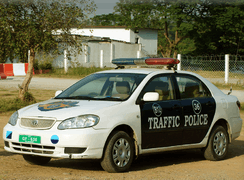
A 2007 Toyota Corolla of the Islamabad Traffic Police on Duty.
-
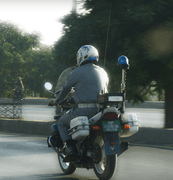
An Islamabad Traffic Police Suzuki motorbike patrolling.
-
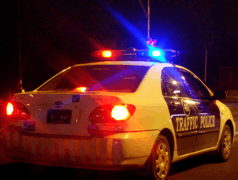
An Islamabad Traffic Police 2007 Toyota Corolla patrolling at night.
-
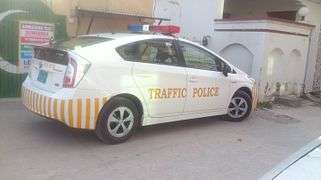
Islamabad Traffic Police 2016 Toyota Prius.
See also
References
- ↑ "Pakistan launches model traffic police in Islamabad". Xinhua News Agency. January 28, 2006.
- ↑ "PM's Son Gets Ticket for Traffic Violation". The News International. Archived from the original on January 6, 2010. Retrieved 2010-01-06.
